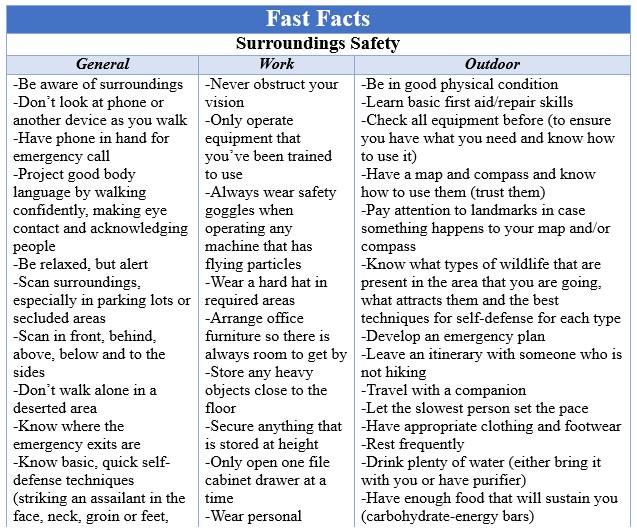Do you pay attention?
Our society today has so many distractions that we typically not aware of our surroundings. This can be problematic and lead to a host of issues, such as injuries while at work at a bare minimum. Unfortunately, it can have much dire consequences when we don’t pay attention while out in public. How do you protect yourself? What can you do to be safer?
 General Safety
General Safety
When it comes to personal safety, we could all do a much better job. The best thing that you can do is be aware of your surroundings. You can do this by not looking at your phone or other device as you walk. Have your phone in your hand in case you need to make an emergent call, but don’t use to text or talk. When you are walking, it is essential to project good body language by walking confidently, making eye contact and acknowledging people. You need to be relaxed, but alert. Next, it is important to scan your surroundings. This will alert you to any possible dangers. This is especially good idea when in parking lots or secluded areas. While scanning, it isn’t just looking in front of you, but behind, above, below and to the sides. If possible, try not to walk alone in a deserted area. If you are in a building, know where the emergency exits are so you don’t have to waste time looking for them if you need to use them. It is extremely beneficial to know basic, quick self-defense techniques. Some of these include striking an assailant in the face, neck, groin or feet. Screaming loudly for help will draw attention to you and what is happening. If they ask you for your belongings, throw them away from you so you can run while the assailant is distracted. If you are grabbed and being held, try to use your assailant’s weight against them by shifting your body in a way that throws them off balance. Remember, your best chance of survival is to get away during the initial attack.
Work Safety
Many of don’t think about the hazards that our jobs can entail on a daily basis, but they are there. One of the most important things you can do is to never obstruct your vision. If you work in an area with equipment, only operate equipment that you’ve been trained to use. Always wear safety goggles when operating any machine that has flying particles. If the area you work requires a hard hat, make sure you wear it. Injuries can occur in office spaces too. To decrease the chances of this happening, make sure furniture is arranged so there is always room to get by, store any heavy objects close to the floor, secure anything that is stored at height and only open one file cabinet drawer at a time to decrease the chance of it tipping over. No matter what your job is, if it requires you to wear personal protective equipment (PPE), then you need to wear when appropriate. Also, it is vital that if you notice any unsafe conditions, you report it as soon as possible to prevent yourself or others from getting injured.
Outdoor Safety
When you are outside in the wilderness, there is a great deal that could go wrong. It is important to be prepared for almost any situation. There are things that you can do before you ever set foot on a trail. This includes being in good physical condition, learn basic first aid/repair skills and checking all equipment to ensure you have what you need and know how to use it. It is also essential to have a map and compass and know how to use them. You need to be able to trust your map and compass—don’t go based off of just landmarks. However, it is crucial to pay attention to landmarks in case something happens to your map and/or compass. Know what types of wildlife live in the area that you are going, what attracts them and the best techniques for self-defense for each type. Develop an emergency plan and leave an itinerary with someone who is not hiking. If possible, travel with a companion and let the slowest person set the pace. It is imperative to have the appropriate clothing and footwear when hiking to keep you warm/cool and protected. It is key to rest frequently, drink plenty of water (either bring it with you or have purifier) and have enough food that will sustain you while you are expanding a significant amount of energy (carbohydrate-energy bars are great snacks). Make sure you dispose of trash properly to avoid attracting wildlife. You should set up camp before it gets dark…a good rule to follow is to give yourself two hours to do this. Build your fires in a safe area and don’t leave them unattended. Be aware of poisonous plants, especially when going to the bathroom and don’t eat anything that you don’t know for sure what it is. If there is a thunderstorm, avoid any isolated trees, get below the tree line, get in a low area where you can crouch into a ball with your feet as close together as possible and stay away from anything metal.
Being aware of your surroundings is vital whether you are walking to your car from a store, at work taking something out of your file cabinet or out hiking in middle of forest. By following these tips, you will be better prepared to handle any situation that comes your way.